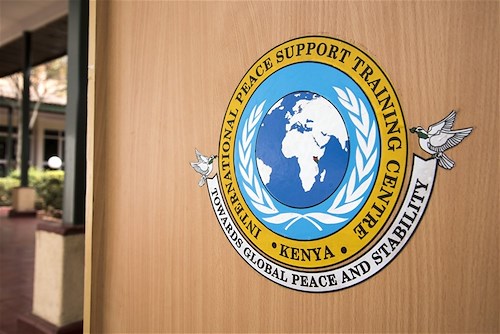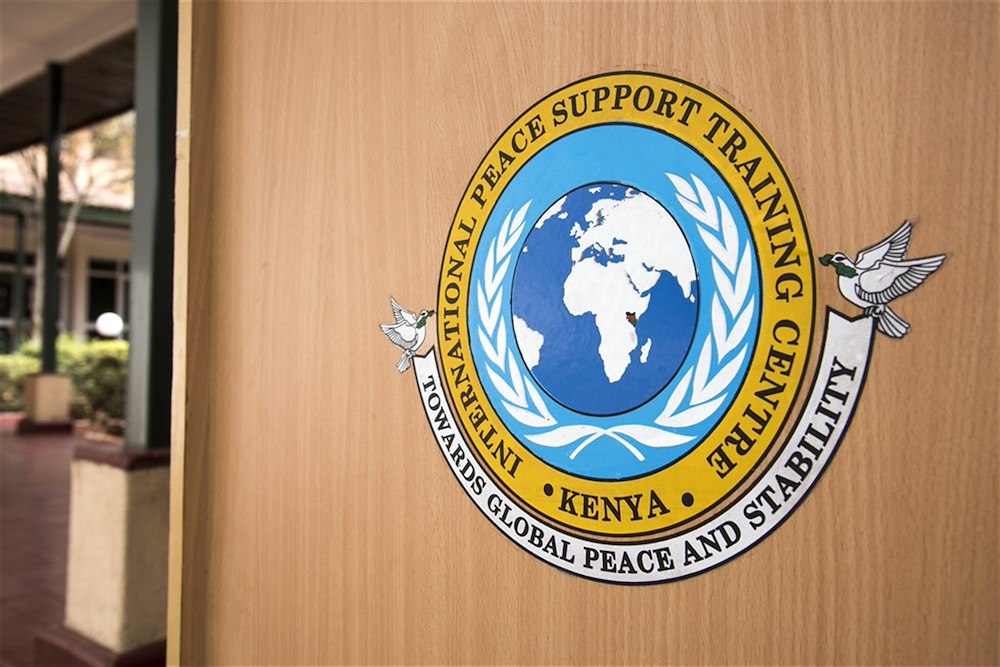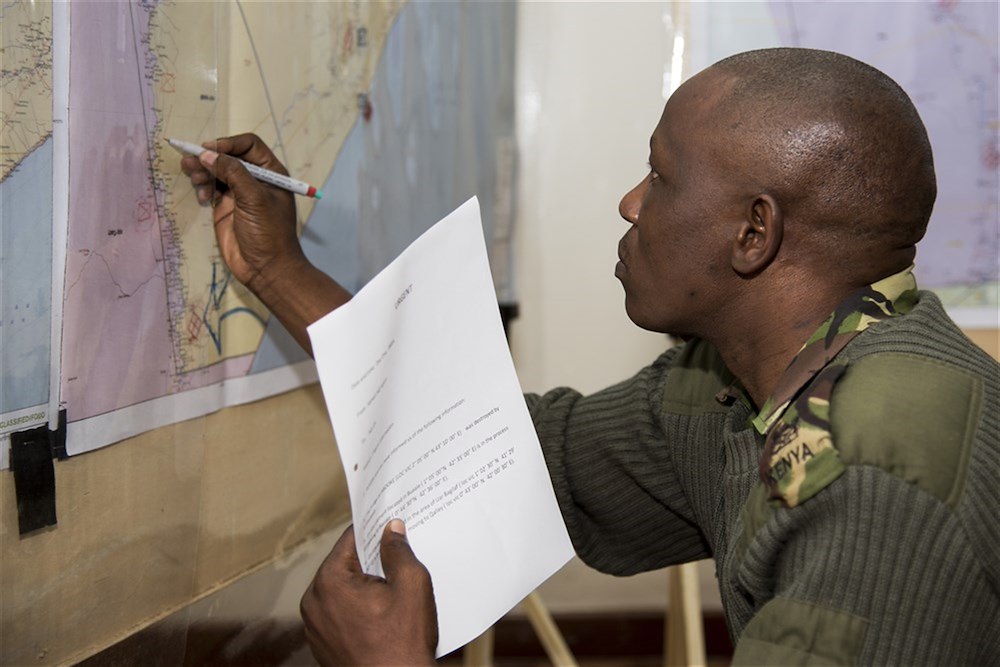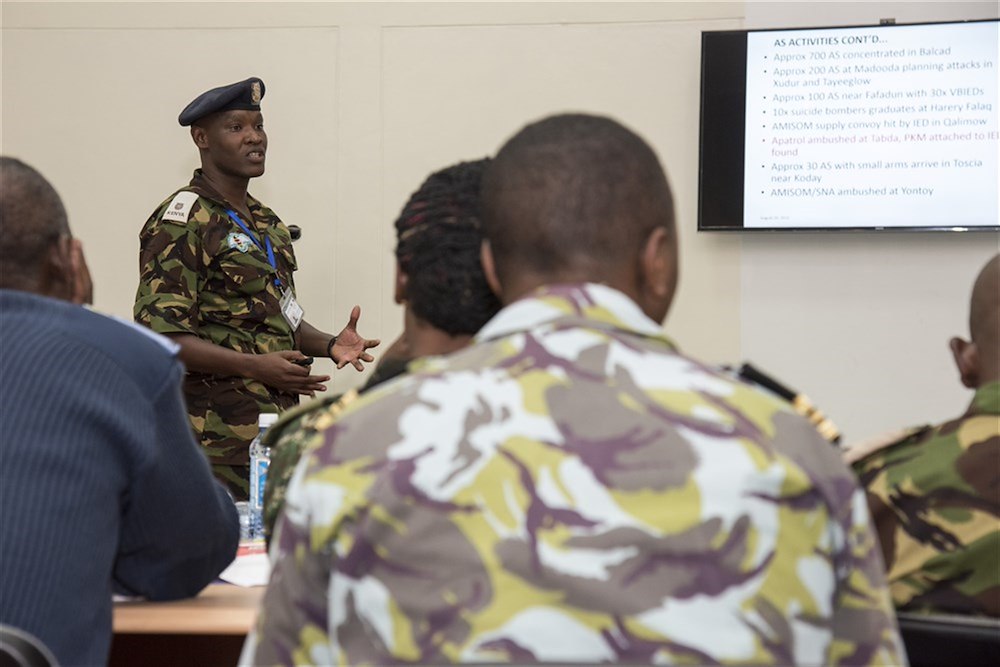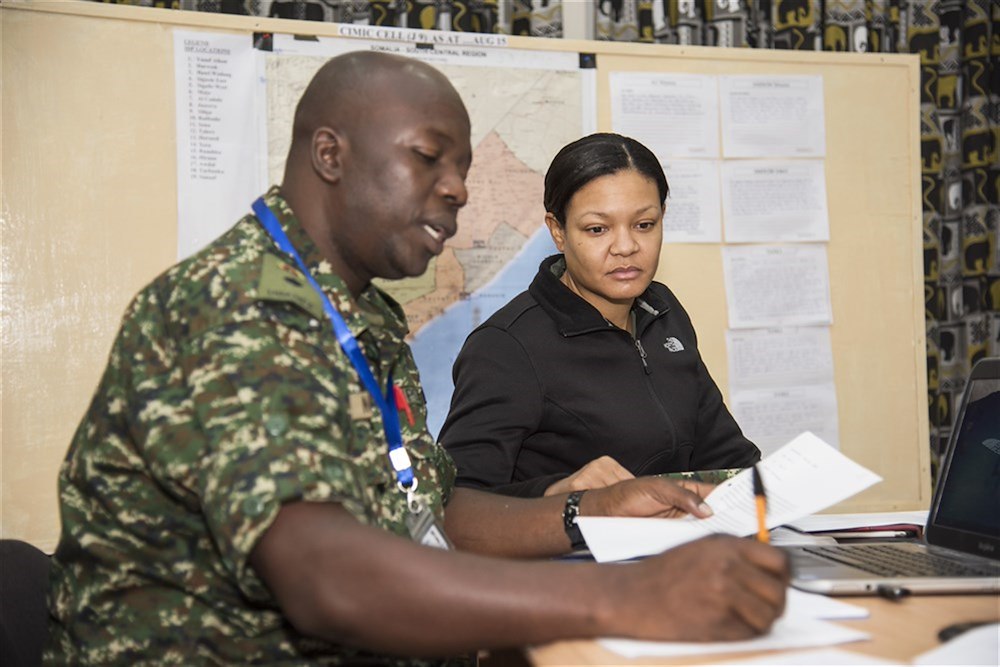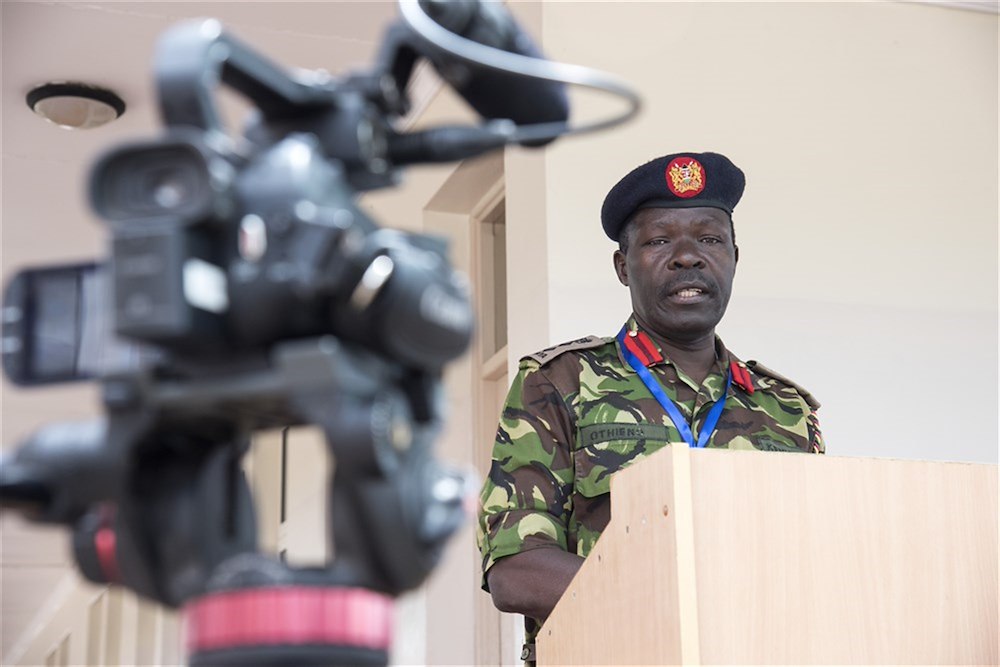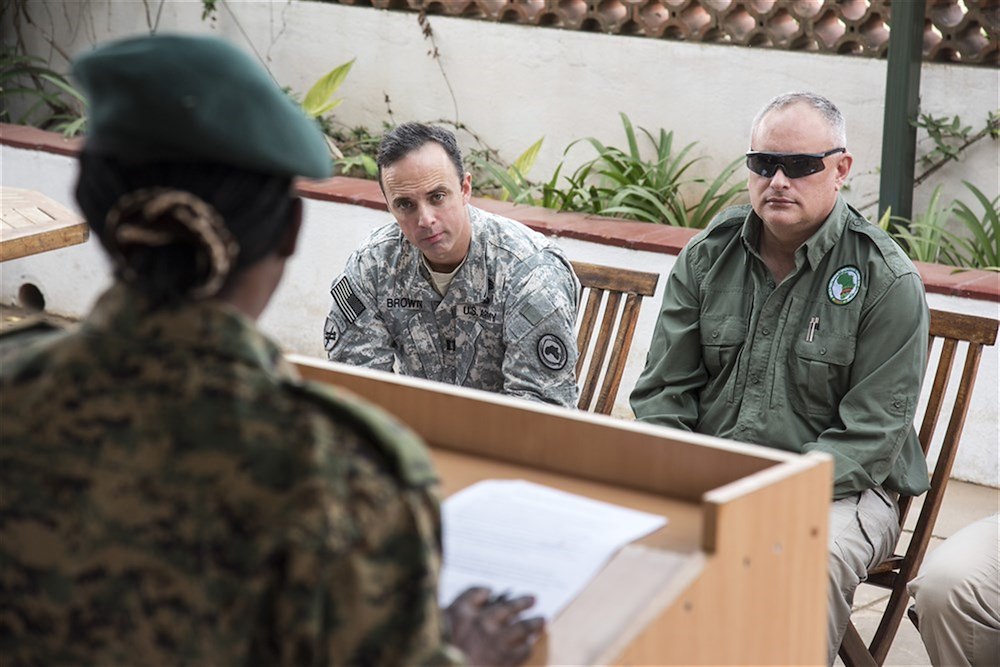Gallery contains 6 images
×
Photo 1 of 6
Course Prepares Multinational Partners for Somalia Mission (1) of (6)
Nineteen officers from the Uganda People’s Defense Force (UPDF) and Kenyan Defense Force (KDF) completed the 16th iteration of the U.S. Department of State’s Africa Contingency Operations Training & Assistance (ACOTA) Force Headquarters training course at the International Peace Support Training Center in Nairobi, Kenya, Aug. 28, 2015. The course was designed to prepare staff officers from the African Union Mission in Somalia contributing countries for possible assignment to AMISOM Force Headquarters as a part of the command staff there. (U.S. Air Force photo by Staff Sgt. Nathan Maysonet/released)
Photo by: Staff Sgt. Nathan Maysonet
Photo 2 of 6
Course Prepares Multinational Partners for Somalia Mission (2) of (6)
Kenyan Defense Force Maj. Balata Kotea, Africa Contingency Operations Training & Assistance (ACOTA) African Union Mission in Somalia (AMISOM) Force Headquarters training course attendee, updates a map of Somalia with the latest AMISOM and Al-Shabaab troop movements at the International Peace Support Training Center in Nairobi, Kenya, Aug. 25, 2015. Kenya is one of the AU countries contributing to the forces in Somalia battling Al-Shabaab and the ACOTA course helps familiarize the attending officers with the military decision making process, so they can better advise and prepare solutions to the problems they might face in the field. (U.S. Air Force photo by Staff Sgt. Nathan Maysonet/released)
Photo by: Staff Sgt. Nathan Maysonet
Photo 3 of 6
Course Prepares Multinational Partners for Somalia Mission (3) of (6)
Kenyan Defense Force Maj. David Nzuve, Africa Contingency Operations Training & Assistance (ACOTA) African Union Mission in Somalia (AMISOM) Force Headquarters training course attendee, briefs command staff officers during a culmination exercise at the International Peace Support Training Center in Nairobi, Kenya, Aug. 26, 2015. The course was designed to prepare staff officers from AMISOM contributing countries for possible assignment to AMISOM Force Headquarters as a part of the command staff there, and as staff members the officers were asked to prepare daily briefings regarding the day’s events. (U.S. Air Force photo by Staff Sgt. Nathan Maysonet/released)
Photo by: Staff Sgt. Nathan Maysonet
Photo 4 of 6
Course Prepares Multinational Partners for Somalia Mission (4) of (6)
Joyce Craig, Africa Contingency Operations Training & Assistance (ACOTA) African Union Mission in Somalia (AMISOM) Force Headquarters training course instructor, right, works with a Uganda People’s Defense Force officer on how to plan Civil military cooperation activities at the International Peace Support Training Center in Nairobi, Kenya, Aug. 26, 2015. The course was designed to prepare staff officers from AMISOM contributing countries for possible assignment to AMISOM Force Headquarters, and part of that training included organizing civil military operations to build support and confidence among the Somali people. (U.S. Air Force photo by Staff Sgt. Nathan Maysonet/released)
Photo by: Staff Sgt. Nathan Maysonet
Photo 5 of 6
Course Prepares Multinational Partners for Somalia Mission (5) of (6)
Kenyan Defense Force Col. Shadrack Othieno, Africa Contingency Operations Training & Assistance (ACOTA) African Union Mission in Somalia (AMISOM) Force Headquarters training course attendee, briefs the media during a mock press conference at the International Peace Support Training Center in Nairobi, Kenya, Aug. 25, 2015. The course was designed to prepare staff officers from AMISOM contributing countries for possible assignment to AMISOM Force Headquarters, the public affairs training is to prepare PA teams for the significant media presence in Somalia. (U.S. Air Force photo by Staff Sgt. Nathan Maysonet/released)
Photo by: Staff Sgt. Nathan Maysonet
Photo 6 of 6
Course Prepares Multinational Partners for Somalia Mission (6) of (6)
U.S. Army Capt. Daniel Brown, Africa Contingency Operations Training & Assistance (ACOTA) African Union Mission in Somalia (AMISOM) Force Headquarters training public affairs mentor, left, and Edward Wilson, ACOTA instructor, right, act as media during a mock press conference at the International Peace Support Training Center in Nairobi, Kenya, Aug. 25, 2015. The course was designed to prepare staff officers from AMISOM contributing countries for possible assignment to AMISOM Force Headquarters, and the public affairs mentors questioned AMISOM PA representatives to prepare them for the significant media presence in Somalia. (U.S. Air Force photo by Staff Sgt. Nathan Maysonet/released)
Photo by: Staff Sgt. Nathan Maysonet
Nairobi, Kenya -- More than 22,000 military and law enforcement personnel from across East Africa are participating in the African Union Mission in Somalia (AMISOM). These men and women are tasked with assisting the Somali Federal Government in their effort to stabilize the country and foster political dialogue and reconciliation.
Leading these and other African Union (AU) forces are officers from countries throughout Africa, and helping to make this level of cooperation possible is the Africa Contingency Operations Training & Assistance (ACOTA) Force Headquarters Training held at the Humanitarian Peace Support School at the International Peace Support Training Center in Nairobi, Kenya.
Recently, 19 officers from the Kenyan and Ugandan militaries graduated from this course’s 16th iteration.
“This training has been very beneficial in imparting the mentor’s vast knowledge on us,” said Uganda People’s Defense Force (UPDF) Lt. Col. Martin Nahurira, a course attendee. “After this training the participants are well equipped to go and work in AMISOM Force Headquarters as staff members in all staff functions. We have learned a lot as a team during our time here, especially when it comes to military operations in a peace support and peace keeping environment.”
The U.S. Department of State’s ACOTA training has been around since the late 1990s and is the predecessor to the African Crisis Response initiative, which was created as a result of the instability in Somalia during that time.
According to the State Department, the course is designed to enhance capacities and capabilities of the U.S.’s African partner nations, regional institutions, and allied peacekeeping resources to enable them to plan, train, and deploy competent forces to meet constantly changing field conditions with minimal non-African assistance and involvement.
“The idea was that U.S. forces could not continue to operate in so many places throughout the world and needed to help facilitate countries in solving problems in their own backyard,” said retired Col. Don Zimmer, ACOTA country manager. “Somalia has been an ungoverned space since the late 80s, making it possible for Al-Qaeda and Al-Shabaab to hide and operate there. The U.S. may not be directly handling the situation in Somalia, but there still needs to be a solution. It’s in the interest of Africa to solve this, and in the case of AMISOM it’s working.”
The officers graduating from this program will likely work at the AMISOM Force Headquarters as command staff, so the course is intended to get them up to speed on the military decision making process and how to implement it in a multi-national joint command staff.
“The military decision making process has enhanced and furthered our understanding of planning and analysis, which will help us solve problems that may occur in the mission area,” said Nahurira. “If we can apply the military decision making process to all contingents in all sectors of Somalia all AMISOM forces will be speaking one language.”
The multi-week course began with AU and U.N.-mandated training, covering topics such as the protection of civilians, elimination of sexual violence and responding to the use of child soldiers by enemy forces. Following this, instructors covered intelligence operations, counter insurgency operations, indirect fire operations and more.
“What I found in this course is very relevant to what is happening in Somalia,” said Kenyan Defense Force (KDF) Col. Shadrack Othieno. “The clan dynamics in Somalia were clearly brought out, and I found it to be a major issue in Somalia. The class also brought out the importance of staff coordination in headquarters, and the importance of intelligence analysis and how to convert that intelligence into actionable material.”
The final week of the training was devoted to the culmination exercise that combined all of these topics into a week of practical application.
“In the last week we do a command post exercise. We give them a concept of operation regarding the situation in Somalia, and they do mission analysis briefings based on the real world situation there,” said Zimmer. “The participants create a course of action briefing for leaders and prepare an operations order and then put it into action.”
To accomplish their objectives during the culmination exercise, the attendees worked within a joint integrated command staff, a system designed to handle the administrative, operational and logistical needs of a multi-force unit.
This system breaks responsibilities down into nine areas of responsibility: manpower, intelligence, operations, logistics, plans, signals, training, finance and civil operations. These groups work together using the military decision making process to meet their objective, which in their case is to engage the terror organization Al-Shabaab in Somalia.
“The joint setup here at ACOTA I hope is going to be one of the pieces of knowledge we apply to international setup here and beyond,” said Nahurira. “It will guide me in setting up my operations center in conjunction with my team and let me apply what we learned against Al Shabaab so that peace is returned to Somalia in the near future.”
As the latest class graduates, another group of AU officers are already slated to attend the upcoming October class, and with the courses’ ongoing success, more and more East African military personnel will receive the same instruction, which will create an increasing level of continuity and cooperation within AMISOM.
“Credit must go to the organizers of this course,” said UPDF Col. Michael Nyarwa. “It’s not easy to realize that even if we are a single country we are still coming from different sub units, and now the staff, which come from different countries, have to set the stage for everyone and begin working together to understand the operational environment, which is very complex when considering Al-Shabaab. So understanding it, appreciating it, and providing an agreeable solution is what this course has enabled us to achieve.”

